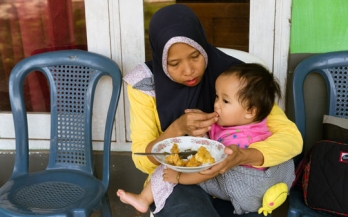- 20/12/2024
KEY MESSAGES Micronutrient deficiencies are widespread globally; recent studies revealed that 1 in 2 children and 2 in 3 women are deficient in at least one micronutrient
Fortifying staple foods with micronutrients is a costeffective and safe intervention that is proven to prevent micronutrient deficiencies and related outcomes
While food fortification programmes are widely implemented around the world, gaps remain. The availability and coverage of high-quality fortified foods are often low, even in countries with fortification mandates, and many countries that could benefit from fortification programmes do not have them.
Countries need support to implement best practices around appropriate programme design, effective monitoring of quality and compliance, and regular review of programme assumptions to ensure they remain safe and impactful over time.
National governments, industry, technical partners, and donors all have diverse roles to play in strengthening food fortification programmes and enhancing impact.
- 12/11/2024
Deficiencies in essential vitamins and minerals (micronutrients) cause devastating damage, particularly for children and women of reproductive age, resulting in increased risks of death, disabilities, more severe and longer-lasting illness, and compromised cognitive and physical development and performance and productivity of people and countries.
- 06/06/2024
To ensure the success of LSFF, governments can establish and strengthen national mandatory fortification standards as well as regulatory frameworks that ensure access to high-quality fortified foods across the entire population. Strong regulations also help ensure a level playing field for fortified food producers where all are held to the same standard.
- 21/06/2023
The Commercialisation for Biofortified Crops (CBC) project was launched by GAIN and HarvestPlus in 2020 with an overall goal to reach at least 167 million consumers with nutrient-dense biofortified foods (previously piloted by HarvestPlus) by 2022 in six countries in Africa (Nigeria, Kenya, and Tanzania) and Asia (India, Bangladesh, and Pakistan), through commercial pathways.
- 21/04/2023
Micronutrient deficiencies (also known as hidden hunger) are a significant public health problem globally. Pre-pandemic estimates found 1 in 2 children and 2 in 3 women suffering from a micronutrient deficiency. Levels of deficiency are likely to be even higher today given the protracted global food crisis arising from the COVID pandemic and Russia’s invasion of Ukraine.
- 26/10/2022
Malnutrition (hidden hunger) which means deficiencies of vitamins and minerals poses severe health and economic threat to Nigeria. It remains one of the leading causes of mortality among children under five and pregnant and nursing mothers in Nigeria.
- 02/05/2022
As part of critical knowledge generation to inform policy development and stakeholder alignment on the prospects for rice fortification in Nigeria, a detailed landscape analysis of Nigeria's rice sector was undertaken along with a technical feasibility assessment of the opportunities and viability of rice fortification in Nigeria.
- 11/10/2022
Today, more than 125 countries have mandatory food fortification programmes. Food fortification requires a "premix" – a mixture of vitamins and minerals – that can then be added to various staple products.
- 17/09/2022
Motivated by the need for such information for its own programmes, the Global Alliance for Improved Nutrition (GAIN) developed the Fortification Assessment Coverage Toolkit (FACT) in 2013 for carrying out coverage assessments of fortification programmes.
- 11/07/2022
Micronutrient deficiencies are a public health challenge in Bangladesh. Many children, women, and vulnerable populations are not getting the nutrients they need for proper brain development, immunity, and physical and mental health. Together with diversified diets, large scale food fortification has the potential to make a significant impact on micronutrient deficiency in Bangladesh.









